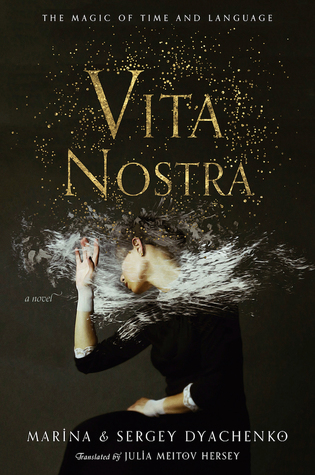"Vita Nostra" review
Overview
Title: Vita Nostra
Author: Marina Dyachenko, Sergey Dyachenko
Subgenre: Magical school, Literary fiction
2022 Bingo squares: Two authors, Book club, Urban fantasy, Timey Wimey (HM), Ifs/Ands/Buts, Family matters
Recommended if: you want to read a very weird novel with a lot of symbolism
Not recommended if: you want all of your plots to make a lot of sense
LGBTQ rep: N/A
Stars: 5/5
Review
It’s not often that the ending of a book leaves me completely lost as to what just happened - the last such book/ending I read was Fine Structure, and I read it specifically on the recommendation that it was confusing - but Vita Nostra certainly did its best, and I needed a lot of help from the internet to supplement what little I figured out on my own.
Here are a couple links you might want to read once you’ve finished the book:
- The final discussion thread from when it was a book club pick on the fantasy subreddit
- This Medium post
- This answer on Goodreads
There’s a lot of symbolism and metaphor; some of it is literary, some of it philosophical, and some of it religious. The book starts out as a magical school plot, with some possibly-snarky societal critique of baroque application processes and studying requirements in modern universities. Then things start to get…extremely weird (they were already weird).
Vita Nostra is translated from Russian, and it’s the first book in a trilogy that’s completed in Russian; however, at the time of publication of this review, only Vita Nostra has been translated. Regardless, the novels in the series are only thematically related, and Vita Nostra is a standalone in terms of plot; its ending is self-contained, and there is no continuation.
After the break, I will put a couple of my own thoughts about the symbolism that I didn’t see anywhere else online.

Thoughts on the ending
Yegor
Sometimes—during the formative period—a person like that, especially a young person, may become a shadow of another verb. A verb in the imperative mood. The imperative entity leaves imprints, the subjunctive entity accepts them.
But why is this the case? Well, the subjunctive mood conveys doubt, wishing/wanting, what might be. The imperative mood is a command, making something happen. The removal of doubt. So Sasha commands Yegor to pass his exam. Indeed that’s how she escapes the time loop:
If a sum of realities is expressed through a subjunctive mood, then in order to come out of the loop, we must first of all define the actual reality—the current one—then express it through the narrative and lock it in with a command.
The “actual reality” is “lock[ed] in with a command” by Sasha, and this is how she exerts her will on the universe. So of course she will be dominant over a subjunctive mood verb.
Kostya
Kostya is a pronoun. I think he is a specific pronoun, in fact he is “He” as in the pronoun form of God. And when Sasha kills His father in the exam (which I think is what happens) then He becomes God, but not a new Rule, only a Noun, because Sasha removed the fear from love.
I think that Farit Kozhennikov fell somehow and became a Rule instead of the Word of God, and that’s why fear and love are the same, so Sasha has to kill him and let his son take his place. I don’t know enough about the Bible to know if there’s any parallel here but I’m curious if there’s something where no one else should have to suffer/take their own tests because she passed hers and He ascended or something; that would be super cool additional symbolism.
